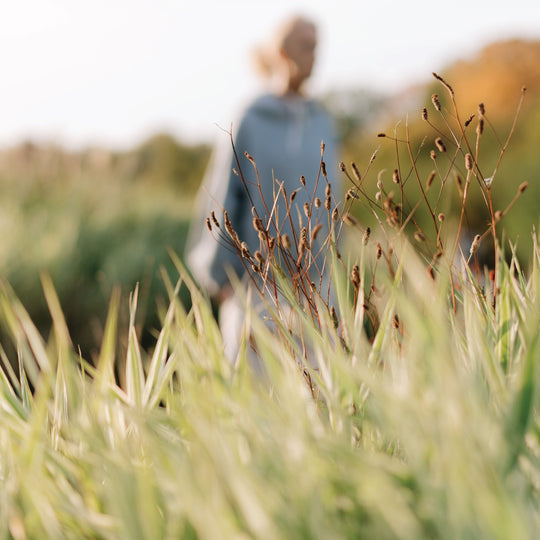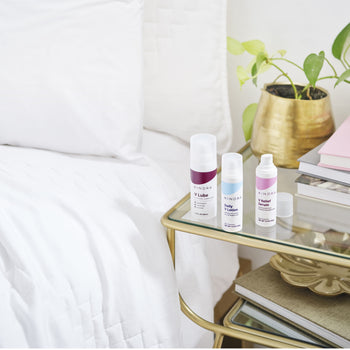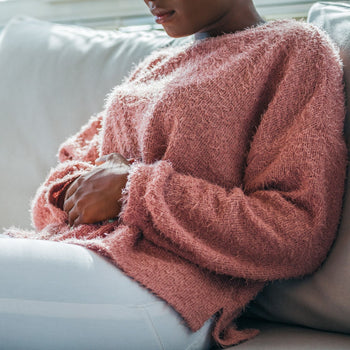It’s the time of year when your weekends are likely filled with outdoor activities. Working in the garden, backyard cookouts, family bike rides…It almost feels wrong to not take advantage of the warm weather. Until your allergies get the best of you, that is.
Maybe you’re just used to dealing with allergies, and the runny nose, itchy eyes, and scratchy throat that tends to come with them. But if you feel like your allergies are suddenly worse now that you’ve hit perimenopause — or you’re experiencing them now for the first time ever — well, know that it’s probably not a coincidence.
Surprise, surprise: There’s actually an interesting connection between menopause and allergies. The good news is that there are ways to manage symptoms so they don’t interfere with your everyday life.
What Are Allergies — And What Causes Them?
According to Payel Gupta, M.D., an allergy and immunology specialist, clinical instructor at Mount Sinai Medical Center, and assistant clinical professor at SUNY Downstate Medical Center, an allergy is when a person’s immune system overreacts to something in the environment that isn’t normally harmful. “The body releases histamine and other chemicals in response to being exposed to the thing that they are allergic to and it causes inflammation and irritation in different parts of the body,” she says.
There are different types of allergies, which include:
Seasonal allergies
According to the American College of Allergy, Asthma, and Immunology (AACI), seasonal allergies occur when the body reacts to something in the environment connected to the flowering and pollination of certain plants, grasses, and trees. Dr. Gupta says that symptoms can include runny nose, congestion, sneezing, itchy nose, itchy eyes, watery eyes, itchy skin, and rashes.
People most commonly deal with seasonal allergies in the spring (when everything is in bloom), but the condition can happen at other times of year as well. For the majority of places in the U.S., peak seasonal allergy season is from February until early summer. Thanks to global warming, allergy season is lasting longer and is more intense.
Mold, dust, and pet hair allergies
This is another type of environmental allergy, like seasonal allergies. Here, the cause is mold, dust, or pet hair. The symptoms are often the same as they are for seasonal allergies; certain molds might also trigger asthma symptoms (like wheezing and shortness of breath). These kinds of allergies may also not be tied as much to specific seasons, as you can have dust or pet dander in your home at any time.
Skin allergies
If you’re experiencing red bumps, itchy skin, or a rash, the ACAAI says you may have a skin allergy. There are a few different kinds of skin allergies, including eczema, hives, and contact dermatitis (when your skin reacts to something you’ve touched, like certain metals in jewelry or poison ivy). The cause of a skin allergy can be tricky to pinpoint; it could be something in your environment or something you ate. Working with an allergist can help determine the cause.
Food allergies
This is when your immune system overreacts to an otherwise harmless protein in food. (It’s not the same as something like lactose intolerance, where your body can’t digest certain foods.) The most common food allergies are milk, egg, peanuts, tree nuts, soy, wheat, fish, and shellfish. Sometimes a person might get hives, rashes, or stomach pains if they eat something they’re allergic to; in more serious situations, a food allergy might cause low blood pressure and anaphylaxis (throat closing up) and requires emergency medical care.
Eye allergies
According to the Asthma and Allergy Foundation of America, eye allergies (aka “allergic conjunctivitis” if you’re feeling fancy) happen when an allergen gets in your eye, which then inflames the tissue that lines the inside of the eyelid and outside of the eyeball. It can be just as unpleasant as it sounds, causing redness and itching. It typically affects both eyes, not just one. (And unlike pink eye — the other kind of conjunctivitis — eye allergies are not contagious.)
Asthma
Per the National Institutes of Health, asthma is a chronic health condition that inflames the airways in your lungs, making it hard to breathe. The exact cause is unknown, but family history, viral infections, and early exposure to allergies (or existing allergy issues) may increase your risk of getting it. Asthma attacks (where symptoms suddenly get serious) can cause shortness of breath, chest tightness, wheezing, and trouble breathing.These attacks can be triggered by many of the things that trigger allergies, like mold, pollen, dust, and pet hair.
Does Menopause Trigger Allergies or Make Them Worse?
There’s very limited research on whether the menopause transition can trigger allergies or make them worse. However, the research that exists shows there may be a relationship between a person’s hormones and their risk of developing allergies. While allergies are more common among boys than girls, research shows that puberty seems to activate something that makes allergies and asthma more common (and severe) among women.
Shockingly (not), experts believe this may have to do with estrogen. A 2015 study published in Frontiers In Immunology argues that puberty, menstruation, pregnancy, hormonal birth control, and (drumroll) menopause are all tied to changes in (or worsening of) allergy and asthma symptoms. The researchers explain that most immune cells have estrogen receptors, meaning they can respond to the hormone. Changing levels of estrogen during times like puberty, pregnancy, and perimenopause might affect how immune cells respond to allergens — although experts aren’t exactly sure how that plays out.
There might also be a connection between skin allergies and hormone levels. Estrogen decreases during menopause, which can make skin more sensitive and prone to eczema.
Women are also more likely to have a food allergy than men. Things actually even out around menopause, although again, researchers aren’t exactly sure why.
Interestingly, there is a lot of research and data connecting menopause with an increased risk of asthma. Going through menopause is linked to developing asthma for the first time, and having more severe symptoms. Experts think that there’s something about the menopause transition itself that can trigger asthma, but aren’t clear on the why. However, since estrogen fluctuations play some kind of role in allergy symptoms — and allergy and asthma often go hand-in-hand — it’s likely that the hormone plays a role with asthma, too. For example, women who already have asthma and who go on hormone replacement therapy (HT) often find their asthma symptoms get better.
It should also be said that any sudden allergy issues might be caused by something else besides menopause. “Allergies can get worse for many reasons at any point in our life,” says Dr. Gupta. “This can be secondary to external factors like moving to an area with more allergens, natural worsening of allergies over time, and increased pollen counts secondary to climate change.” So if you recently moved to a place where ragweed is common, for example, that might also be behind your worsening allergies.
When to See a Doctor About Allergies
If you’re constantly sneezing, coughing, wheezing, and just all-around miserable, Dr. Gupta says it’s time to see a board-certified allergist. “Allergists are doctors that specialize in treating allergies and are the best in providing many options, like immunotherapy for allergies,” she explains.
First what the doctor will do is a blood test or skin test to determine what things you’re allergic too. Is it pollen? Dust? Your friend’s new cat? Eggs? This is how you’ll know for sure.
Once you know what’s causing your allergies, you and your doctor can discuss treatment options. “Allergy shots and sublingual immunotherapy tablets are a great way to help with allergies,” Dr. Gupta says. She explains that both of these methods slowly help your immune system stop reacting to the allergens that you are allergic to and will eventually reduce your symptoms. “They are not a cure but are very helpful,” she says.
Dr. Gupta says that there are also over-the-counter medications available, specifically antihistamines that come in the form of pills, nasal sprays, and eye drops to help your symptoms. “In addition, because allergies cause swelling of the tissues inside of your nose, a steroid nasal spray is also a very helpful medication for people with allergies,” she says.
Other Tips for Dealing With Allergies During Menopause
In addition to these solutions, there are other ways you can manage your allergies—especially if they are a minor annoyance and not severely impacting your life. Here are some expert-approved ideas:
- Keep things clean: If you’re allergic to dust mites or pet hair, you might have to vacuum and dust more frequently than most people to reduce the amount of irritants in your home. Dr. Gupta says to make sure you’re washing your bedding at least once a week, too.
- Moisturize smartly. If you are prone to skin allergies, use skin products that have a seal from the National Eczema Association, meaning they are gentle enough to use on highly sensitive, reactive skin.
- Invest in an air purifier. Getting a quality air purifier (or a few, depending on how big your home is) with a HEPA filter can help cut back on indoor allergens that might circulate in the air, like pollen and dust.
- Try a sinus rinse: If your allergy symptoms tend to cause unpleasant nasal drippage or stuffiness, Dr. Gupta recommends trying a Neti Pot or other kind of saline rinse. These products, which you can nab at most drugstores, flush mucus and irritants from the nasal cavity so you can breathe easier. “[Just] remember to keep the bottle and system clean. Otherwise mold can grow in the bottle and that can go into your sinuses and can cause even more problems,” she says. And always use distilled, not tap water.
- Be aware of high-pollen times. “Pollen counts are highest between 5 a.m. and 10 a.m.,” Dr. Gupta explains. Plan accordingly by scheduling outdoor activities for later in the day if you can help it. She says it can also help to keep your windows and doors closed during these times to prevent pollen from making its way into your home.
- Wear shades. Not only do they protect your eyes from UV damage and glare, Dr. Gupta says sunglasses can act as a barrier between your eyes and potential allergy triggers.
Outlook for Post Menopause
As the earlier scientific studies showed, fluctuations in estrogen seem to make allergies worse. That means it should get better post menopause as hormone levels even back out, although there haven’t been any scientific studies on this to confirm a connection.
In the meantime, if allergies are wrecking your life, see an allergist. This is not something you have to live with. There are many solutions out there so you can enjoy nature without it taking a toll.
Sources
Payel Gupta, M.D., FACAAI, Assistant Clinical Professor, SUNY Downstate Medical Center, Brooklyn, NY.
American College of Allergy, Asthma, & Immunology. Seasonal Allergies. December 2017.
American College of Allergy, Asthma, & Immunology. Skin Allergies. Accessed 5/5/22.
Asthma and Allergy Foundation of America. Eye Allergies (Allergic Conjunctivitis). October 2015.
Baptist A. et al., Annals of Allergy, Asthma, and Immunology. Older women with asthma: special challenges in treatment and self-management. 2014.
Centers for Disease Control and Prevention. Indoor Environmental Quality: Health Problems, Mold. February 2022.
Food Allergy Research & Education. What Is a Food Allergy? Accessed 5/5/22.
Keselman A. et al., Frontiers In Immunology. Estrogen Signaling Modulates Allergic Inflammation to Sex Differences in Asthma. November 2015.
Mayo Clinic. Allergies and Asthma: They Often Occur Together. May 2021.
McCleary, N. et al. The Journal of Allergy and Clinical Immunology. Endogenous and exogenous sex steroid hormones in asthma and allergy in females: A systematic review and meta analysis. April 2018.
National Eczema Society. Eczema in Later Life. Undated.
National Heart, Lung, and Blood Institute. What Is Asthma? March 2022.
National Library of Medicine. MedlinePlus. Allergy. May 2018.
Pali-Schöll I. et al., Current Opinion in Allergy and Clinical Immunology. Gender aspects in food allergy. June 2019.
Triebner K. et al., The Journal of Allergy and Clinical Immunology. Menopause as a predictor of new on-set asthma: A longitudinal Northern European population study. January 2016.
Zaibi H. et al., Tanaffos (Respiration). Asthma in Menopausal Women: Clinical and Functional Particularities. July 2020.
USDA National Institute of Food and Agriculture. Yes, Allergy Seasons Are Getting Worse. Blame Climate Change. May 2022.












